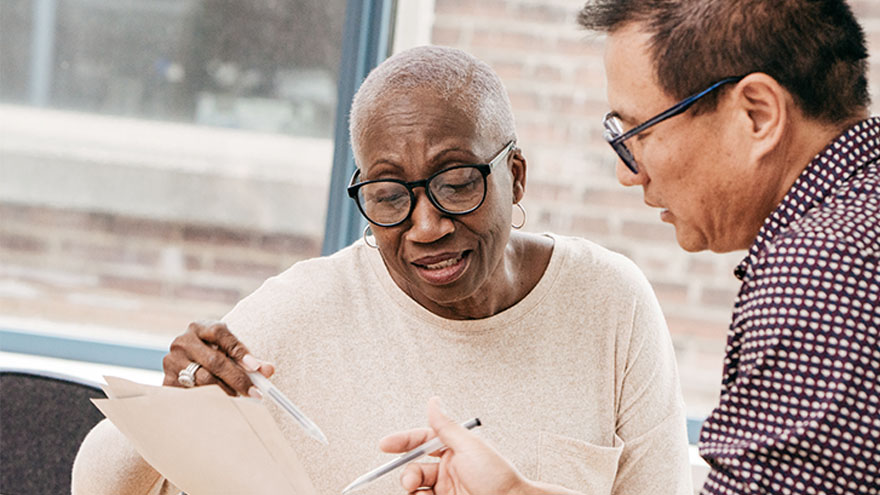Search
Results for ''s'
Clear-
Paola’s Story: Bringing Hope and Determination to Patient Care
You may recognize her from billboards around town or the cover of Renown's latest annual report, but what you might not know is the story behind the now-familiar face. Paola Espinoza-Patino is the oncology unit's associate nurse manager at Renown Regional, and she grounds her work in hope and determination daily. Meet Paola:
Read More About Paola’s Story: Bringing Hope and Determination to Patient Care
-
How Regular Cervical Cancer Screenings Can Save Lives
According to the American Cancer Society, approximately 13,820 new cases of invasive cervical cancer will be diagnosed, and 4,360 women will die from cervical cancer. However, cervical cancer is preventable with regular screening tests and the HPV vaccine. It’s important to note that medical advances have allowed progress in diagnosing and treating cervical cancer. While it used to be one of the most common causes of cancer death for American women, the incidence of death has significantly declined. What to Know About the HPV Vaccine HPV vaccination is the best way to prevent cervical cancer and is recommended for all youth starting as early as age 9, or for teens and adults up to age 45 who didn’t start or finish the series. In Nevada, only 50.1% of teens ages 13-17 have been vaccinated for HPV. There are 13 types of HPV, and the vaccine Gardasil 9 protects against 9 of those HPV strains, greatly reducing the incidence of cervical cancer among vaccinated individuals. What to Know About Cervical Cancer Screenings The CDC says the most important thing you can do to help prevent cervical cancer is to have regular screening tests starting at age 21. And there are two common tests that can detect early stages of cervical cancer (or precancer) and improve health outcomes. The pap test (or pap smear). This screening looks for precancers. Women should begin getting pap smears when they’re 21. The human papillomavirus (HPV) test looks for the virus that can cause these cell changes. Cervical Cancer Screening Schedule The American Cancer Society offers the following guidelines for screenings: All women should begin cervical cancer screening at 21. Women between 21 and 29 should have a pap test every three years. Beginning at 30, the preferred way to screen is with a pap test combined with an HPV test every five years. This is called co-testing and should continue until age 65. A pap test (or pap smear) is performed during a regular screening appointment to look for precancers, cell changes on the cervix that might become cervical cancer if they are not evaluated or appropriately treated. Typically outpatient procedures can reduce the risk of long-term health impacts that prevent pre-cancerous cells from becoming cancer cells. Women over 65 who have had regular screenings in the previous ten years should stop cervical cancer screening as long as they haven’t had any severe precancers found in the last 20 years. How to Get Screened Request an appointment with your primary care physician or OBGYN to schedule a screening.
Read More About How Regular Cervical Cancer Screenings Can Save Lives
-
Celebrating Resilience: Raquel's Remarkable Journey Through Breast Cancer Treatment
Raquel was 33 when she was diagnosed with breast cancer. It was April 2023, when she found a lump in her breast and was referred to the William N. Pennington Cancer Institute. After comprehensive imaging, she was diagnosed with invasive lobular carcinoma, which is a type of breast cancer that begins in the milk-producing glands of the breast. Between June 2023 and January 2024, she received a total mastectomy, chemotherapy and radiation at Renown Health. “Breast cancer is uncommon in women under 40, but any woman with a mass or lump in her breast should have an exam by a physician and imaging at any age,” said Dr. Lee Schwartzberg. In fact, according to the Centers for Disease Control and Prevention (CDC), only 9% of all new cases of breast cancer in the U.S. are found in women younger than 45. “It was a pretty scary diagnosis, but I’ve been led by great people through the process,” she said. “They were so helpful and there for me throughout the chemo and radiation.” Raquel's journey through breast cancer treatment at the William N. Pennington Cancer Institute was marked by the exceptional care provided by the Renown Health team, including nurses, nurse navigators, therapists, support teams and providers. Among the dedicated professionals, Dr. Michelle Chu and Dr. Lee Schwartzberg played pivotal roles in Raquel's diagnosis and subsequent treatment plan. Their expertise, compassion and commitment to patient care left an indelible impact on Raquel's experience. Their thorough examination and comprehensive approach ensured that Racquel received the best possible care for her invasive lobular carcinoma. In addition to the care provided at Renown, Raquel greatly benefitted from being connected with a mentor by Dr. Chu. This mentor, Kayla, had undergone a similar diagnosis and treatment plan, and at the same age Raquel. They texted and called each other throughout Raquel’s treatment, providing additional support through a challenging time. As of January 2024, Raquel is done with her treatment and continues to see her care team for follow-up appointments. “I’m through the worst and ready to rebuild my life,” Raquel said. To help celebrate this milestone, Nevada Athletics invited Raquel to receive the game ball at a Nevada Men’s Basketball game. She was joined on the basketball court for this special recognition by her husband, Raul; mother, Arlene; and two daughters, Ryleigh and Rhiannon. Racquel's journey is not only a testament to her resilience but also a tribute to the invaluable contributions of Dr. Chu and Dr. Schwartzberg in guiding her towards triumph over breast cancer.
Read More About Celebrating Resilience: Raquel's Remarkable Journey Through Breast Cancer Treatment
-
From Cancer Survivor to Caregiver
Meet Haley Carroll Being a new nurse comes with many challenges and gaining experience is a journey, but Haley Carroll’s first day on the job was far from her first day in a hospital. Haley was diagnosed with lymphoma right before her senior year of high school, and she was declared cancer-free on December 2, 2015. Inspired by the incredible care she received during her cancer treatments and during her time at Renown Children’s Hospital, Haley enrolled in nursing school at the University of Nevada, Reno. She graduated in December 2020, just five years after beating cancer. “I’ve always been interested in nursing,” Haley says. “But once I was diagnosed and began to see everything that my nurses did for me, I knew that that’s what I wanted to do for patients, too.”
-
Handmade Bracelets a Labor of Love for Cancer Patients
The road through cancer treatment can test even the toughest of spirits. A local organization is handcrafting and donating beaded bracelets to the courageous women who have reached the finish line at Renown Infusion Services. After finishing her sixth and final cycle of chemotherapy at Renown Infusion Services, Joan Jackson told her nurse, Daun Russell, RN, she was tired. Russell returned with a box and opened it -- as she does for all cancer patients completing treatment -- and said, “pick one.” What Jackson was selecting was a beautiful, handmade bracelet crafted and donated by the local Soroptimist organization. Jackson picked a purple bracelet with a tag that read, "Congratulations on completing your treatment. Imagine what you can do now." “Picking the bracelet was such a special thing to mark my last day of chemo,” Jackson says. "Their gesture impacted me for the good after going through so much.” The women behind the bracelets Bev Perkins, a member of the Soroptimist International of Truckee Meadows, says the bracelet project began in 2009 as a way of celebrating those who completed cancer treatment. She wanted the project to be hands-on, so she involved the club members by organizing a small budget and asking others to donate jewelry. The group comes together each year to make the bracelets. Perkins disassembles the donated jewelry, adding newly purchased beads to make kits for the bracelets. The volunteers also add a metal tag inscribed with an inspiring word, like “believe,” “hope” or “love.” “It’s a labor of love for us,” says Kay Dumhan, group treasurer. “It’s to show empowerment and to help these women know there are people who are encouraged by them.” “When bracelets are donated there is usually quite a bit of feedback on how much it’s appreciated,” Dumhan says. “We never want to run out so we make sure we have a supply there. We’ve had cancer survivors as members and that makes it all the more personal.”
Read More About Handmade Bracelets a Labor of Love for Cancer Patients
-
Navigating Renowns Cancer Care Resources Your Essential Guide
Cancer is challenging, but no one has to go through it alone. Patients and their loved ones can navigate the journey towards healing and recovery with the proper support and resources from Renown Health. When faced with a cancer diagnosis, access to reliable and comprehensive cancer resources is key. These resources provide vital information, support, and guidance for patients, caregivers and loved ones throughout cancer treatment and recovery. Cancer Resources Breast Cancer Newly Diagnosed Orientation Class Cancer Support Groups Caregiver Support General Cancer Support Group Lymphedema & Physical Therapy Men’s Prostate Cancer Support Group Newly Diagnosed Breast Cancer Workshop Smoking Cessation Spiritual Center Activities & Programs Sterling Silver 55+ Club Facebook Group At Renown and in collaboration with community partnerships, we offer a variety of resources and specialty care programs focused on improving the quality of life after cancer including: Cancer support groups play a crucial role in providing emotional, psychological, and practical assistance to those affected by cancer These groups often consist of individuals who have been through similar experiences and can offer guidance, empathy, and understanding. They provide a safe space for individuals to share their feelings, concerns, and experiences with others who truly understand what they are going through.
Read More About Navigating Renowns Cancer Care Resources Your Essential Guide
-
Lung Cancer Screening and Early Detection
Lung cancer is the leading cause of cancer deaths in both men and women in the U.S. The good news is the five-year survival rate increases dramatically if lung cancer is treated before spreading to other parts of the body. Julie Locken, MD, of Renown Health Imaging, explains more. What are the signs and symptoms of lung cancer? As you might expect, most lung cancer symptoms appear in the chest and can affect your breathing. Watch for signs such as: Persistent cough Constant chest pain Shortness of breath Wheezing Bloody or rust-colored phlegm Hoarseness Swelling of the neck Pain or weakness in the shoulder, arm or hand Recurring pneumonia, bronchitis or other lung infections Loss of appetite and loss of weight can also be signs of lung cancer That said, there are usually no symptoms in the early stages of lung cancer, which means getting screened can truly be a lifesaver. If you have a history of smoking, you should get screened as a precaution. What are the risk factors of lung cancer? Around 80% of lung cancer cases stem from a history of smoking tobacco. But there are other known causes, such as secondhand smoke, radon, asbestos and diesel exhaust. It’s important to do what you can to eliminate exposure to all of these to reduce your lung cancer risk. People with an immediate relative – a parent, sibling or child – diagnosed with lung cancer and people between 50 and 80 years old are also at higher risk and may need to consider screening. People who are at the highest risk are those with a history of smoking tobacco, particularly smokers who averaged one pack of cigarettes per day for 20 years or more, as well as former heavy smokers who quit in the last 15 years.






